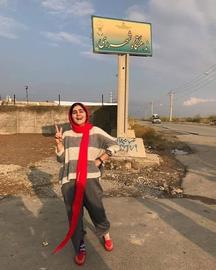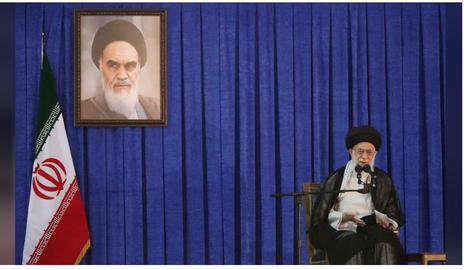Sepideh Gholian, 22, a veterinary student, a labor and civil rights activist and a journalist, was first arrested on November 18, 2018 while she was reporting on protests by the workers of Haft-Tappeh Sugarcane Refinery in Khuzestan. Also arrested were Esmail Bakhshi, a union spokesman, and other labor activists.
Several of those arrested were quickly released but Gholian and Bakhshi were detained without any charges against them being announced. They were also denied access to a lawyer for 30 days and savagely tortured. On January 19, 2019, they were forced to confess to crimes they didn’t commit on Iranian state television. Upon their release on bail, they both denied the veracity of their forced confessions and authorities soon rearrested them in order to silence them.
On September 9, Judge Mohammad Moghiseh of Tehran Revolutionary Court Branch 28 sentenced Gholian to 19 years and six months in prison. At the same time, the judge sentenced six other labor activists, and together, the seven were handed down a total sentence of 110 years in prison. Gholian was released on bail but then was arrested again on November 16, 2019, coinciding with the nationwide protests in response to the steep rise in gas prices. On December 3, Haft Tappeh Sugar Cane Workers’ Union reported that Gholian had been released.
Authorities likely hoped the multiple arrests would silence Sepideh Gholian. But so far, they have yet to succeed.
Gholian spent part of her detention in Sepidar Prison in Ahvaz, the capital of Khuzestan province, where the workers’ protests took place. She had access to Instagram and Twitter during that time, and her posts let the outside world know about the plight of her cellmates. IranWire publishes extracts from some of her posts below.
Dancing is forbidden here. Holding hands is forbidden here. Wearing tight dresses, short sleeves and waist-length shirts is forbidden.
Last week Samieh danced to the tune of the radio program Song of the Rain. The head of the penitentiary castigated her and sent her to the quarantine ward. Samieh attempted suicide while in quarantine. We saw her [afterward], and according to the doctor, she would have died if they had found her two minutes later. After 13 years of not dancing, not kissing and not living, she wanted to put an end to it. She had hanged herself with a bedsheet.
Praying is compulsory. Working is compulsory. Darkness is compulsory. Sewage is overflowing. Water is cut off. We have no showers. We have no sanitary facilities.
Maria’s mother [Maryam Hammadi] wants to wash her daughter using a water flask. They notice it on the CCTV and reprimand her. We do not do anything because we do not want to get reprimanded, too. We criticize her because we have been forced into becoming the jailers’ accomplices.
Most of the time there is no water. We do not have drinking water. Nobody dares to protest. We have been stripped of the right to protest. There are three phone booths for all the people in the prison and, if the phones work, each person can use it for 10 minutes only.
Ward 10 has been drowned in this gloom. They took away the phone card of Hadis’ mother because her pants were tight. She strikes herself and her blood splashes on the corridor floor. Hadis and Maria dance barefoot over the blood. We all stay silent. We all insult Hadis’ mother. We are all accomplices of the jailers.
Here the darkness goes deep. Nasa works in a workshop that belongs to a person who is rolling in money. She works from dawn to dusk, she sews, she cleans. All for 100,000 tomans [$8] a month. We are all silent in the face of this exploitation. We are all accomplices of the jailers and their capitalists.
We have been stripped of all facilities. The state TV is broadcasting forced confessions by Arab women. Sakineh is beaten. For two days Samieh does not dare to get off the bed. We all admonish her. We are all accomplices of the jailer. We have been forced to become accomplices.
The jailers beat the inmates. They shackle and chain them. Water is cut off, phone is cut off, life is cut off. My only thought is that I must go. I must go so that I will not die.
No matter what I eat my stomach rejects it. I throw up and I am not feeling good. Masoumeh, who shoulders everybody’s pain, looks after me until morning. She is a mother from the south and she is the mother of us all. I, too, am a daughter of “Masoumeh in Black,” the mother whose name nobody knows, whose photograph has never been broadcast in one of the state TV documentaries. A grieving, nameless mother.
This prison has 10 wards and in almost all of them there is one mother, or more, with her child. There is not even a separate ward for them. We are all dying in this darkness.
There are a least 250 people who can have visitors. Visits from men are not allowed. We all gather together in white chadors and slippers. Manteaux are forbidden here and white chadors are mandatory. We all move together toward the visiting hall, which does not have enough places for us all to sit. There are so many clashes there and they treat our families so badly that we regret having met with our families.
This darkness is also inflicted on our families.
Now I have been out of Sepidar Prison for days but Sepidar’s pain takes deep root inside you. Who can forget that darkness, that nightmare that goes on forever? You don’t hear anything about this darkness and nightmare outside the walls of Sepidar because it concerns women, because it concerns incarcerated women, because it concerns incarcerated provincial women. Nowhere would you hear: “This is Sepidar Prison...”
Related Coverage:
Sepideh Gholian Arrested Again, 18 November 2019
Imprisoned Activist Speaks Out for All Women Prisoners, 23 September 2019
“I Hear the Voices of the Tortured”, 17 September 2019
Imprisoned Labor Activists Threatened with Heavier Sentences if They Talk to the Media, 21 May 2019
Labor Activists Face Intense Pressure for Another TV Confession, 22 February 2019
Authorities Threaten Labor Activists, Families and Lawyers Following Media Interviews, 13 February 2019
Intelligence Ministry Takes Revenge on Labor Activist, 4 February 2019
Iranian TV Airs Forced Confessions of Labor Activists, 23 January 2019
Sugar Refinery Workers Face New Round of Harassment, 5 December 2018
visit the accountability section
In this section of Iran Wire, you can contact the officials and launch your campaign for various problems




















comments